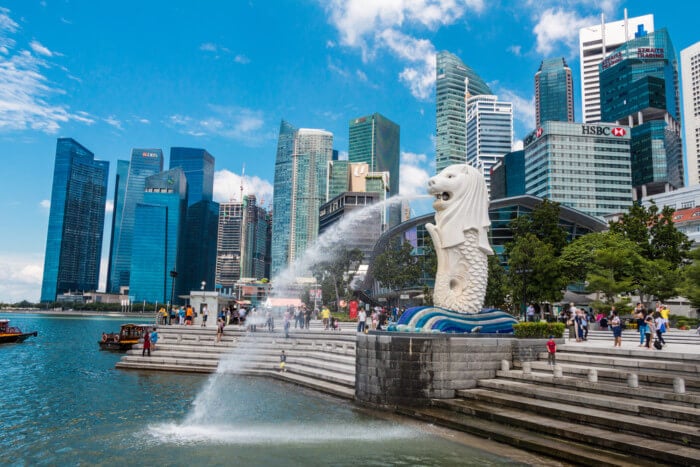Property values in Singapore have increased significantly over the past decade. Besides getting your visa, the main cost of retiring in Singapore will certainly be housing.
To purchase property, prices range from S$30,000 per square meter in prime central areas to under S$15,000 per square meter in the suburbs.
Buying a condo in Singapore is popular among expats, offering amenities like pools, gyms, security, and maintenance services.
Mansions and large houses with gardens are rare in Singapore given limited space and restrictions on foreign investors buying land.
The government also offers affordable public housing called HDB flats, though these units have restrictions on purchase and resale for foreigners.
Overall, expect housing costs in Singapore to take up a significant portion of your budget as a retiree.
Getting a Visa in Singapore
Since Singapore doesn’t have a retirement visa program, obtaining long-term residence requires more planning (and money!) compared to countries with dedicated retirement visas.
The main alternative paths to a retirement visa are:
Employment Pass – This work visa leads to eligibility for permanent residence after living in Singapore for over a year. To qualify, you must have a job offer paying at least S$3,900 per month.
EntrePass – Entrepreneurs and investors can get this visa by starting a Singapore-based business with at least S$50,000 in paid-up capital. It also provides a route to permanent residence.
Foreign Artistic Talent – Renowned artists and cultural figures may qualify for permanent residence by demonstrating contributions to Singapore’s arts scene.
Marriage Visa – Marrying a Singaporean citizen or permanent resident provides a direct path to gain permanent residence.
Investor Visas – Options like the Global Investor Programme (GIP) provide immediate permanent residence in exchange for investing at least S$10 million into a Singapore business.
Alternatively, you can qualify for the GIP by investing at least S$25 million into a fund approved by the Singapore Economic Development Board, or S$50 million into a family office.
Once permanent residence is obtained, you can live in Singapore long-term without needing to maintain a work visa. Do note that PR status requires renewing every 5 years.
Retiree Lifestyle in Singapore
Known for its multiculturalism and ultra-modern amenities, Singapore offers a very comfortable lifestyle for expat retirees. English is widely spoken given Singapore’s British colonial history and status as a global business hub.
The tropical climate stays hot and humid year-round, though indoor spaces feature air conditioning.
Singapore’s low crime rate and general safety makes it easy to settle in quickly as an expat. Activities like walking or taking public transportation at night are worry-free.
The city also has abundant amenities like international shops and restaurants that make the transition smooth.
Due to limited space, most retirees live in high-rise condos rather than houses. Car ownership is extremely expensive, so most rely on the efficient public transit system. Taxi rides are affordable and ubiquitous for older adults who prefer not to drive themselves.
While not as low-cost as neighboring countries, fresh food, utilities, amenities, and dining out in Singapore are priced reasonably compared to Western cities of its stature. Overall, Singapore offers a modern, safe, and convenient lifestyle for expat retirees.
Healthcare in Singapore
Singapore’s healthcare system is renowned as one of the most efficient and high-quality in Asia. The country provides quality medical care and facilities on par with developed Western nations.
The government provides integrated medical savings and insurance accounts for citizens, while expat retirees must enroll in private insurance plans.
Premiums vary based on the level of coverage, deductibles, and co-pays, but expect to budget S$200 to S$400 per month for a robust retirement health plan.
Even without insurance, out-of-pocket costs for general doctor visits, dental care, and prescription medications are quite reasonable as a foreigner choosing to retire in Singapore.
Specialist visits, procedures, and hospital stays are more affordable with insurance coverage.
Singapore’s base of internationally accredited hospitals, cutting-edge technology, and skilled English-speaking doctors and nurses make it a reassuring choice for healthcare in your retirement years.
Best Places to Retire in Singapore
When choosing where to settle down in Singapore, three areas stand out as particularly appealing for retirees – Orchard, Jurong, and Woodlands.
Orchard is Singapore’s prime upscale shopping and entertainment district. Located right in the city center, Orchard offers unparalleled convenience with high-end malls, restaurants, hotels and attractions within walking distance.
The area has a lively cosmopolitan vibe and is well-connected by public transit. Housing options include luxury condominiums and brand new developments.
Of course, the convenience and amenities of Orchard come at a price – expect real estate here to be the most expensive in Singapore.
In western Singapore, Jurong provides a more affordable alternative while retaining good connectivity to the rest of the city. Home to several universities and Singapore’s main port facilities,
Jurong has seen significant development and infrastructure investment in recent years. The area offers a wide range of housing options, from HDB flats to private condos, at prices below central Singapore.
